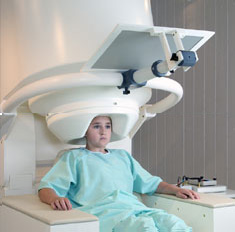Many patients are eventually able to relieve their depression with medication, but their search for the right antidepressant is often a painful trial-and-error process. There are no accurate guidelines to help determine beforehand which antidepressants will work for which patients, and so the patient must sometimes endure months of hopelessness. New hope for speedy recovery is offered by a National Institute of Health (NIH) study in Biological Psychiatry.
The NIH researchers showed subjects a series of frightened faces while scanning one of the emotional centers of the brain, the anterior cingulate cortex, with magnetoencephalography (MEG). The control group, those without depression, showed activation at first but this quickly faded away as they got used to the photographs. Many in the depressed group, however, continued to show very strong activation. This difference may be a key insight into the cause of depression, but the researchers focused instead on finding a practical use for their observation.
Both control and depressed groups were given ketamine, an antidepressant that targets glutamate rather than the more common target serotonin. The ketamine only alleviated negative mood in subjects that showed strong and prolonged activation. The benefits of the antidepressant correlated with the extent of the activation.
The discovery that a brain scan can predict reaction to an antidepressant is very good news. MEG is a relatively quick and easy process, and could appreciably narrow the list of worthwhile medications and thus save patients months of disrupted life. Future studies should hopefully be able to chart the wide variety of reactions and then use scans and other tests so that they can skip blanket remedies to move directly to the most effective treatment for the individual.
